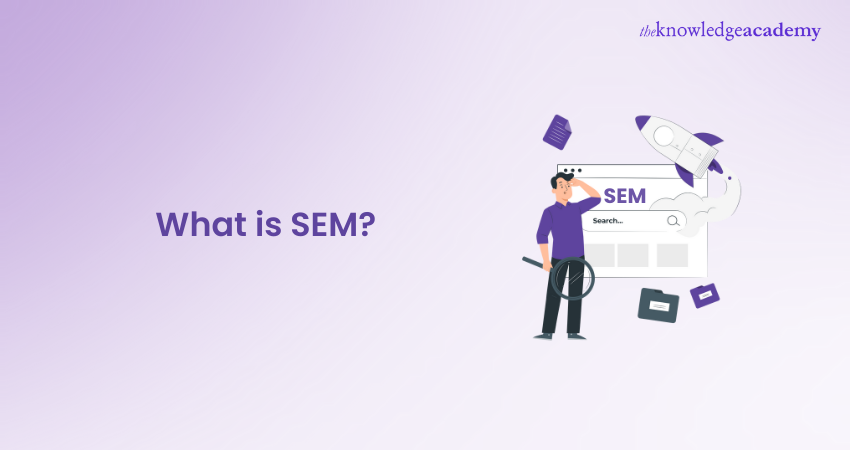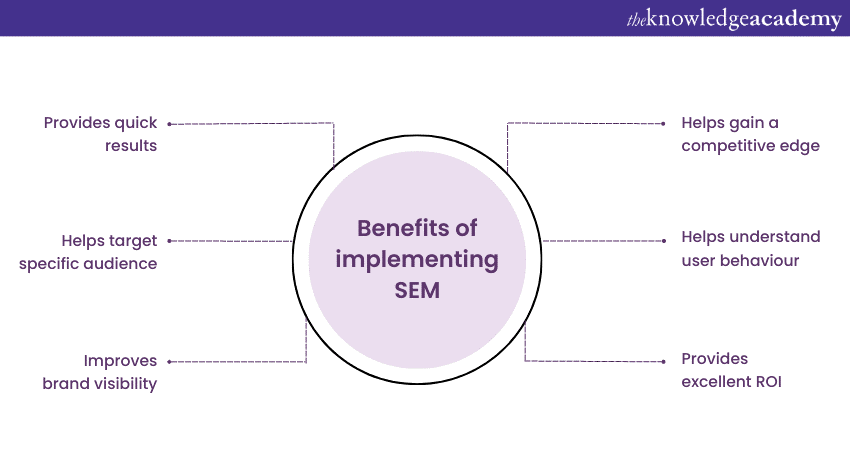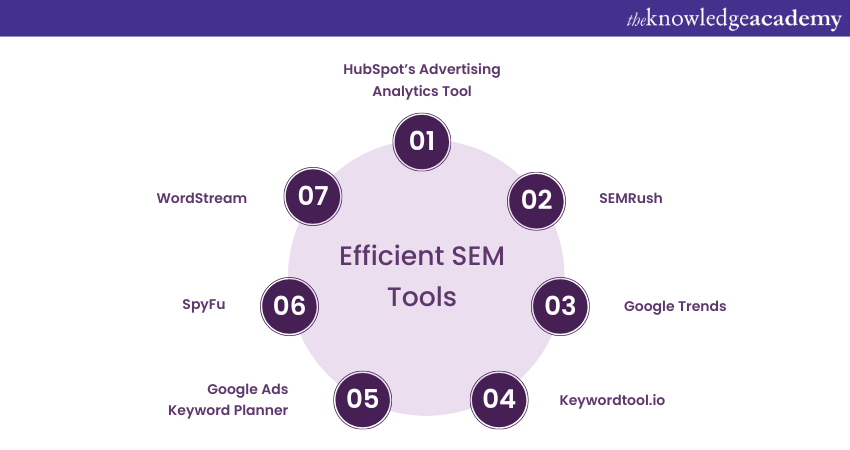We may not have the course you’re looking for. If you enquire or give us a call on 01344203999 and speak to our training experts, we may still be able to help with your training requirements.
We ensure quality, budget-alignment, and timely delivery by our expert instructors.

Are you looking to boost your online presence and drive more traffic to your website? Understanding SEM (Search Engine Marketing) can be a game-changer for your Digital Marketing strategy. But What is SEM exactly, and how can it benefit your business?
In this blog, we will explore What is SEM, including its key components and best practices. Leveraging SEM allows your businesses to target specific keywords to attract potential customers and drive more traffic to your websites. Let’s dive in to grasp an effective way to enhance your online presence and achieve marketing goals.
Table of Contents
1) What is Search Engine Marketing (SEM)?
2) Importance of SEM
3) SEM Strategy
4) How A/B Testing can Complement SEM?
5) Benefits of Implementing SEM
6) Best SEM Tools
7) Conclusion
What is Search Engine Marketing (SEM)?
SEM, or Search Engine Marketing, is the practice of using paid ads to make your website more visible and attractive on search engines. SEM helps you reach potential customers who are searching for your products or services online.
For example, if you sell hiking boots, you can use SEM to bid on keywords related to hiking boots, such as “best hiking boots”, “hiking boots for women”, or “waterproof hiking boots”. When users search for these keywords on Google or Bing, your ads will appear on the top or side of the search results page, along with a link to your website.
You only pay when someone clicks on your ad, which is why SEM, also known as Pay-Per-Click (PPC) advertising, works on this principle. Leveraging SEM and PPC strategies, including PPC and Google AdWords, can significantly boost your brand awareness, website traffic, conversions, and sales.
Importance of SEM
SEM is one of the crucial Digital Marketing Trends that helps a company reach more consumers who are looking for products online. SEM is the practice of using paid ads to increase the visibility and traffic of your website on search engines. SEM is important for several reasons, such as:
a) SEM can help you reach your target audience who are actively looking for your products or services.
b) SEM can help you generate more conversions and sales by directing your ads to landing pages that match the user’s intent.
c) SEM can help you increase your brand awareness and recognition by displaying your ads on the top of the search results pages.
d) SEM can help you complement your organic SEO efforts and achieve a balanced and effective online marketing strategy.
e) SEM can help you get immediate and measurable results that can help you optimise your campaigns and budget.
SEM strategy
A successful SEM strategy is centred on fine-tuning paid search advertisements to achieve a targeted objective. Crafting an effective strategy necessitates a thorough comprehension of paid advertising platforms and the adept handling of performance influencers like keywords, budget, and ad copy. Consider these essential elements in your strategy to secure triumph in paid advertising.
a) Keyword Intent: Understanding the searcher’s intent is critical. Keywords should align with what the user is looking to find or accomplish, whether it’s information, a purchase, or another specific action.
b) Target Audience: Identifying and understanding your target audience allows you to tailor your SEM efforts to the demographics most likely to convert, ensuring a higher return on investment.
c) Keyword Volume and Competition: Analysing the search volume and competitive landscape for keywords helps in selecting terms that are popular yet not overly saturated, balancing visibility with competitiveness.
d) Keyword Cost: Effective budget allocation depends on understanding the cost associated with each keyword, which varies based on competition and search volume.
e) Account and Campaign Structure: A well-organised account and campaign structure improves the manageability and performance of your SEM campaigns, allowing for more targeted ad groups and better optimisation.
f) Copy: The ad copy should be compelling and relevant, with a clear call to action. It must resonate with the target audience and reflect the keyword intent to drive clicks.
g) Landing Page Conversion: The landing page must be optimised for conversion, with a user-friendly design, persuasive content, and a seamless path to completing the desired action.
h) Analytics and Reporting: Regular analysis and reporting are essential for tracking the performance of your SEM strategy. This data informs decisions on optimisation and future strategy adjustments.
Unlock the power of data-driven insights and elevate your Digital Marketing strategies with our comprehensive Google Analytics Certification - sign up today!
How A/B Testing can Complement SEM?
A/B testing is an impactful strategy that works hand-in-hand with Search Engine Marketing (SEM) to optimise both traffic and conversions. Here are five key ways A/B testing complements SEM:
1) Enhanced User Experience: A/B testing lets you experiment with multiple elements of your landing pages to determine what resonates best with your audience. This leads to a more engaging user experience, which is a critical factor in SEM success.
2) Improved Conversion Rates: By testing variations of your landing pages, you can identify which version drives the most conversions. This optimisation ensures that the traffic generated from SEM campaigns is more likely to complete the desired action, be it signing up for a newsletter, filling out a contact form, or making a purchase.
3) Higher Quality Score: Search engines reward relevant and high-quality landing pages with a higher Quality Score. A/B testing helps in fine-tuning your pages to meet these criteria, which can result in lower cost-per-click (CPC) and better ad placements.
4) Data-Driven Decisions: A/B testing provides concrete data on what changes lead to better performance. This data-driven approach to SEM can help you make informed decisions about where to allocate your budget and how to shape your ad strategies.
5) Continuous Improvement: The digital landscape is always changing, and what worked yesterday may not work today. A/B testing is an ongoing process that allows for continual refinement of your SEM efforts, ensuring that your campaigns remain effective over time.
Learn the strategies to rank higher on Search Engines with our SEO Course – register now and see the difference!
Benefits of Implementing SEM
SEM is the strategy of using paid ads to boost your website’s visibility and traffic on search engines. SEM can benefit your business in many ways, such as:

a) Increasing your brand awareness and recognition by showing your advertisements on top of the search results.
b) Reach a highly targeted audience by choosing specific keywords, demographics, locations, and devices for your ads.
c) Get immediate and measurable results by driving traffic and leads as soon as your campaigns go live and tracking your performance with analytics tools.
d) Maximising your Return on Investments (ROI) by controlling your budget and targeting options and paying only for the clicks on your ads.
e) Gaining valuable insights from data and analytics that help you understand your audience, keywords, and ad performance and improve your marketing strategy.
f) Gaining a competitive edge by outranking your competitors and gathering a larger share of the Search Engine Market with relevant and quality ads.
Transform your Google AdWords expertise and drive exceptional results with our immersive Google AdWords Certification - sign up now!
Best SEM Tools
Here’s a curated list of the best SEM tools that can help elevate your online presence and drive targeted traffic to your website:

a) HubSpot’s Advertising Analytics Tool: HubSpot’s Ads software transcends basic traffic and clicks data, offering in-depth insights into how advertisements impact potential customers at different stages of their purchasing journey.
b) SEMRush: SEMRush excels as a comprehensive suite for Digital Marketing, providing extensive services such as keyword research, ranking monitoring, website audits, and traffic analytics. It’s an exceptional resource for uncovering opportunities to organically rank for niche, long-tail keywords while also supporting a range of Search Engine Marketing activities.
c) Google Trends: Google Trends is a valuable tool for monitoring keyword search volumes across various regions, languages, or time periods. It helps identify trending search terms and those declining in popularity, which is crucial for SEM strategies. Particularly for e-commerce, it’s instrumental in pinpointing product or service interest by location, optimising paid campaigns, and ultimately saving costs.
d) Keywordtool.io: Keywordtool.io stands out for its ability to harness data from multiple platforms like Google, Bing, YouTube, Amazon, Instagram, and the App Store. The tool generates a broad array of keyword variations, aiding in the expansion of your keyword list for paid advertisements. It leverages Google Autocomplete to suggest relevant keywords, with the free version offering up to 750 long-tail keyword suggestions per search term.
e) Google Ads Keyword Planner: The Google Ads Keyword Planner stands among the essential Digital Marketing Tools for identifying pertinent keywords for your business and tracking their search frequency over time. It assists in refining your keyword selection to maximise effectiveness and provides bid estimates to align with your budget. Once you’ve selected optimal keywords, the tool facilitates the launch of your advertising campaign directly within its interface.
f) SpyFu: SpyFu offers a window into your competitors’ SEM strategies, revealing the keywords they purchase on Google Ads, their organic search rankings, and their ad variations over the past 12 years. This tool can be invaluable for competitive analysis and strategy development.
g) WordStream: WordStream is a comprehensive advertising management platform that aids in the research, analysis, and optimisation of your ads. It provides advanced reporting tools for in-depth data analysis and features for crafting effective ads. Additionally, WordStream includes alerts and workflow tools to support informed decision-making regarding your ad campaigns.
Conclusion
With the right SEM techniques, you can attain enhanced search engine rankings and drive more qualified traffic to your website. By understanding What is SEM and implementing its tactics, you can significantly boost your online visibility and attract a targeted audience. For a more comprehensive approach, refer to Search Engine Marketing PDF, which offers deeper insights and strategies. You can use the tools mentioned in this blog to create an effective campaign.
Unlock your Digital Marketing potential and accelerate your career growth with our comprehensive Digital Marketing Courses – sign up now!
Frequently Asked Questions
Is SEM the Same as SEO?

No, SEM (Search Engine Marketing) includes both paid search ads and SEO (Search Engine Optimisation). SEO focuses on organic search rankings, while SEM encompasses a wider range of strategies, including paid advertising.
What are the key Components of a Successful SEM Campaign?

A successful SEM campaign includes keyword research, effective ad copy, targeted audience selection, budget management, and continuous performance analysis to optimise results.
What are the Other Resources and Offers Provided by The Knowledge Academy?

The Knowledge Academy takes global learning to new heights, offering over 3,000 online courses across 490+ locations in 190+ countries. This expansive reach ensures accessibility and convenience for learners worldwide.
Alongside our diverse Online Course Catalogue, encompassing 19 major categories, we go the extra mile by providing a plethora of free educational Online Resources like News updates, Blogs, videos, webinars, and interview questions. Tailoring learning experiences further, professionals can maximise value with customisable Course Bundles of TKA.
What is The Knowledge Pass, and how Does it Work?

The Knowledge Academy’s Knowledge Pass, a prepaid voucher, adds another layer of flexibility, allowing course bookings over a 12-month period. Join us on a journey where education knows no bounds.
What are Related Courses and Blogs Provided by The Knowledge Academy?

The Knowledge Academy offers various Digital Marketing Courses, including Digital Marketing, SEO and SEM Courses. These courses cater to different skill levels, providing comprehensive insights into Digital Marketing methodologies.
Our Digital Marketing blogs covers a range of topics related to Digital Marketing, offering valuable resources, best practices, and industry insights. Whether you are a beginner or looking to advance your skills as a Digital Marketer, The Knowledge Academy's diverse courses and informative blogs have you covered.
Upcoming Digital Marketing Resources Batches & Dates
Date
 Digital Marketing Course
Digital Marketing Course
Fri 28th Mar 2025
Fri 23rd May 2025
Fri 25th Jul 2025
Fri 26th Sep 2025
Fri 28th Nov 2025






 Top Rated Course
Top Rated Course



 If you wish to make any changes to your course, please
If you wish to make any changes to your course, please


